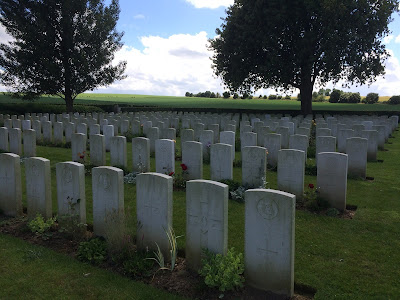British regimental number research. First World War research. Military research. British Army regiments. Regimental numbering sequences between 1881 and 1918. Regimental number series. Other rank prisoners of war 1914.
1 October 2016
Re-numbered after death
Over on my WW1 Remembrance blog I have just posted a depressing roll call of close to a thousand men who lost their lives one hundred years ago today on the 1st October 1916.
There are a lot of Territorial Force infantrymen included in this roll, 114 of whom have six-digit numbers which belong to new regimental number series which would not come into effect until the 1st March 1917. So why re-number men who had been killed five months earlier? The answer is simple. These men were all reported missing in action on the 1st October 1916 and would not be officially presumed killed in action until a year later (or until their remains were positively identified, whichever was the soonest).
Of these 114 men, 91 have no known grave and are commemorated on the memorial at Thiepval; they were never found. Twenty of these re-numbered men are buried in Warlencourt British Cemetery, a Lutyens cemetery which I visited in July this year. According to the Commonwealth War Graves Commission, the cemetery was made in late 1919 when graves from smaller cemeteries and the battlefields of Warlencourt and Le Sars were brought in.
Here, the Commonwealth War Graves Commission records can be extremely helpful as they usually include concentration reports and graves registration documents. For example, 276032 Private John Hanson of the 1/7th Durham Light Infantry was originally brought in from a battlefield grave and recorded as 370 Pte W H Hansen. This was later corrected to 3750 Pte W H Hanson, although he had long since been re-numbered as 276032 Pte W H Hanson and it is this six-digit number which appears on his headstone at Warlencourt. These CWGC reports are therefore useful in locating a man's original number, although these may also appear in the Soldiers' Effects Register, published over on Ancestry.
I research soldiers! Contact me if you need help with your military ancestor.
Subscribe to:
Post Comments (Atom)




No comments:
Post a Comment